This post may contain affiliate links. For full information, please see our disclaimer here and our Privacy Policy here.
Welcome to the Solo Female Travel Safety Tips and Advice page for Tunisia!
This page is brought to you by Solo Female Travelers Tours, our curated small group trips for women, by women.
On this page you will find first-hand, unbiased, and real safety tips, advice and reviews from women traveling solo, submitted directly from their personal experiences in the country.
Their opinions are unfiltered and submitted independently as part of the Solo Female Travel Safety Index, a ranking of 210 countries and regions based on how safe they are for women traveling solo.
The safety scores range from 1 to 4 with 1 being the safest and 4 being the most dangerous for solo female travelers.
You don’t need to login to read the below reviews. But do sign up or login to share your solo travel experiences, country safety rating and comments.
Jump straight to: Travel Tips | About the Index | Resources I Leave a Review
MAKE A DIFFERENCE – LEAVE YOUR SAFETY REVIEWS!
We can make the world a safer place for women traveling solo together. Sign up to our portal and leave your reviews NOW. Share your experience with other solo female travelers and help us empower more women through travel.
Tunisia Country data
We have compiled a few data points below that can help you better understand Tunisia and have more context when thinking about travel safety.
Official country name: Republic of Tunisia.
Etymology: The country name derives from the capital city of Tunis.
Country map
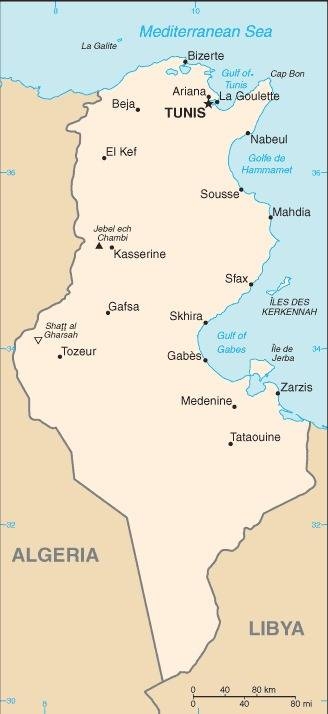
Locator map
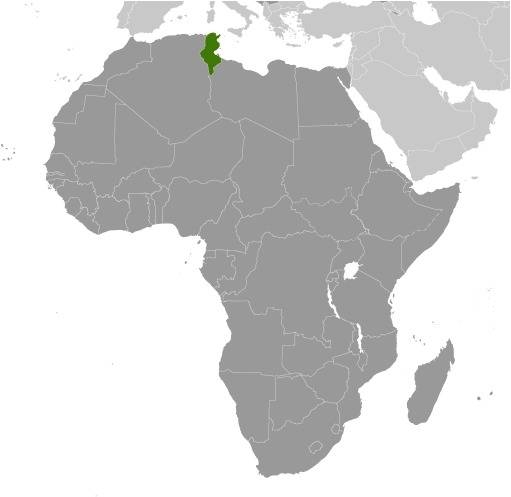
Flag
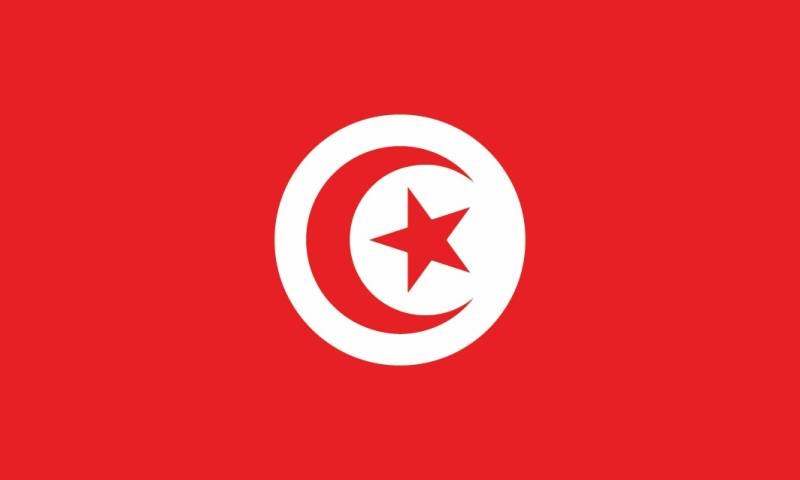
Capital: Tunis.
Independence / foundation: Tunisia has been the nexus of many different colonizations including those of the Phoenicians, the Carthaginians, Romans, Vandals, Byzantines, various Arab and Berber kingdoms, and the Ottomans.
Rivalry between French and Italian interests in Tunisia culminated in a French invasion in 1881 and the creation of a protectorate. Agitation for independence in the decades following World War I was finally successful in convincing the French to recognize Tunisia as an independent state in 1956.
Population: 12 million.
Currency: Tunisian Dinar (TND)
1 USD = 3.09 - 3.19 TND
1 EUR = 3.36 - 3.40 TND
Time zone: UTC+1
Languages spoken: Arabic (official, one of the languages of commerce), French (commerce), Berber (Tamazight); note - despite having no official status, French plays a major role in the country and is spoken by about two thirds of the population.
Religions: Muslim (official; Sunni) 99%, other (includes Christian, Jewish, Shia Muslim, and Baha'i) <1%.
Climate: Temperate in north with mild, rainy winters and hot, dry summers. Desert climate in the south.
Real GDP (ppp – purchasing power parity): $130.59 billion.
Real GDP per capita (ppp): $10,600.
Main airports: Tunis Airport or Tunis-Carthage International Airport.
World heritage sites in Tunisia
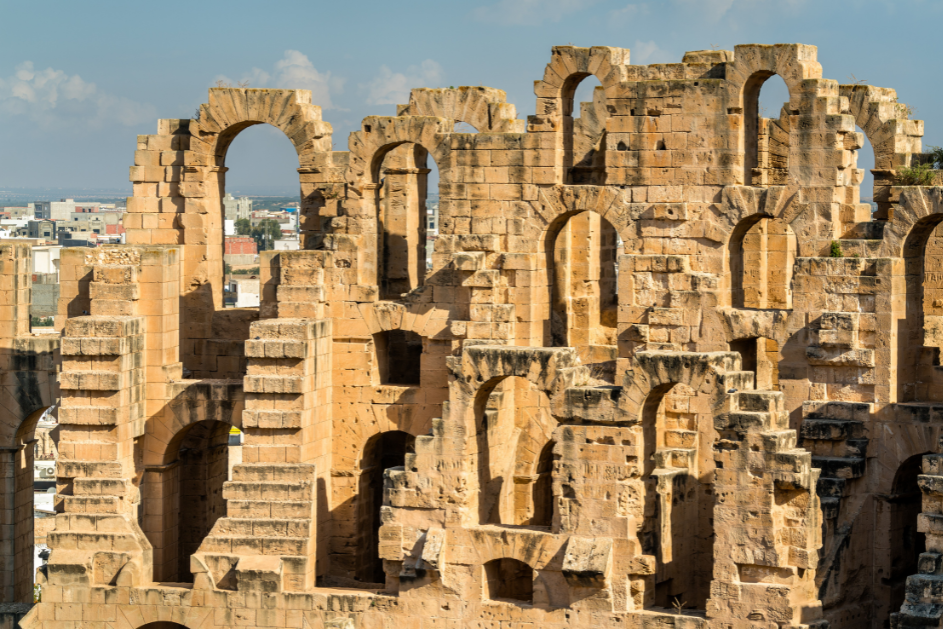
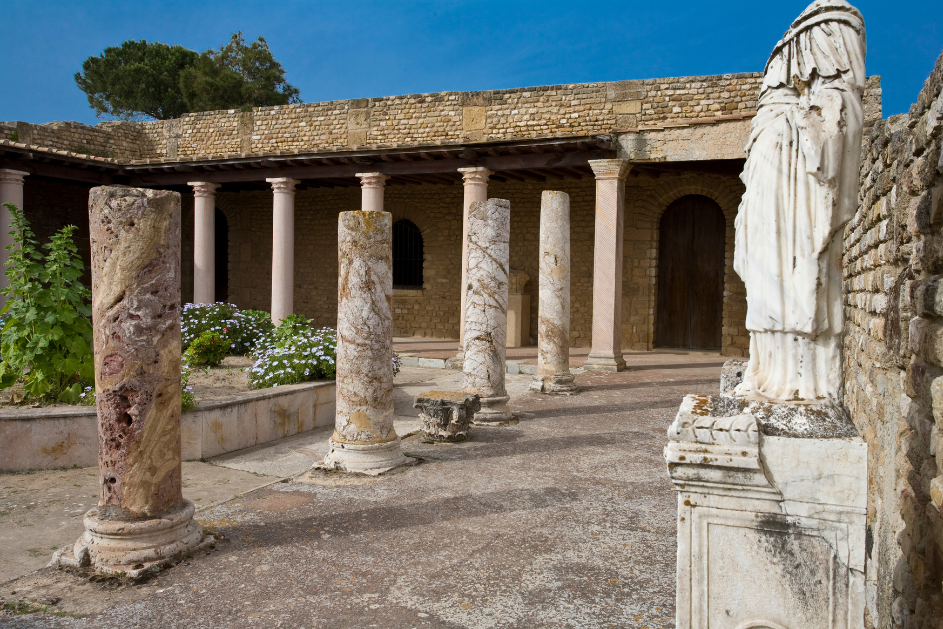
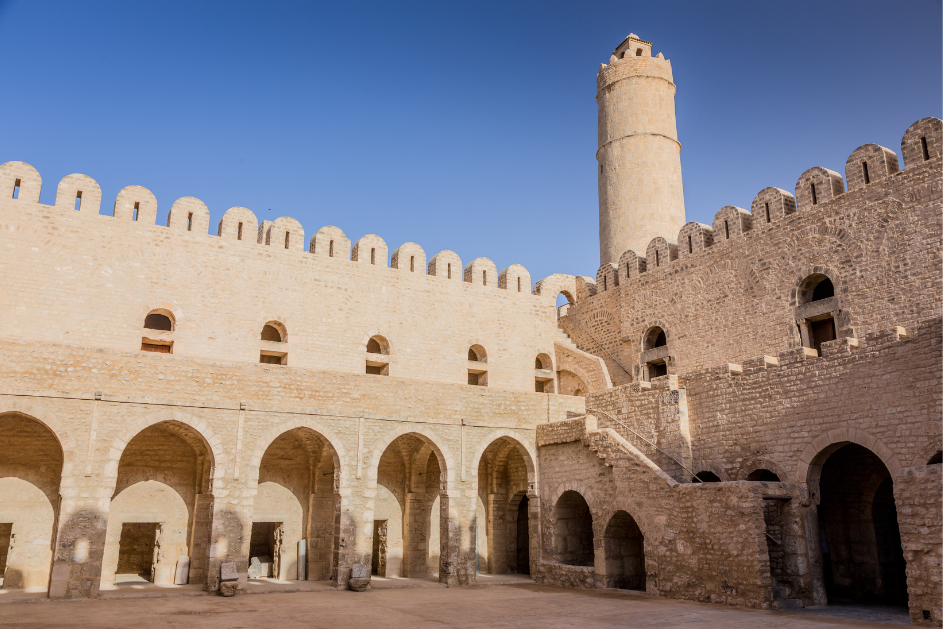
There are over 1,100 world heritage sites spread across more than 165 countries. New ones are added every year, and some may be removed from the list for various reasons.
Number of UNESCO listed sites: 9.
Top world heritage sites:
- Amphitheatre of El Jem.- Archaeological Site of Carthage.
- Medina of Sousse.
- Medina of Tunis.
- Ichkeul National Park.
- Punic Town of Kerkuane and its Necropolis.
- Kairouan.
- Dougga / Thugga.
- Djerba: Testimony to a settlement pattern in an island territory.
Interesting facts about Tunisia
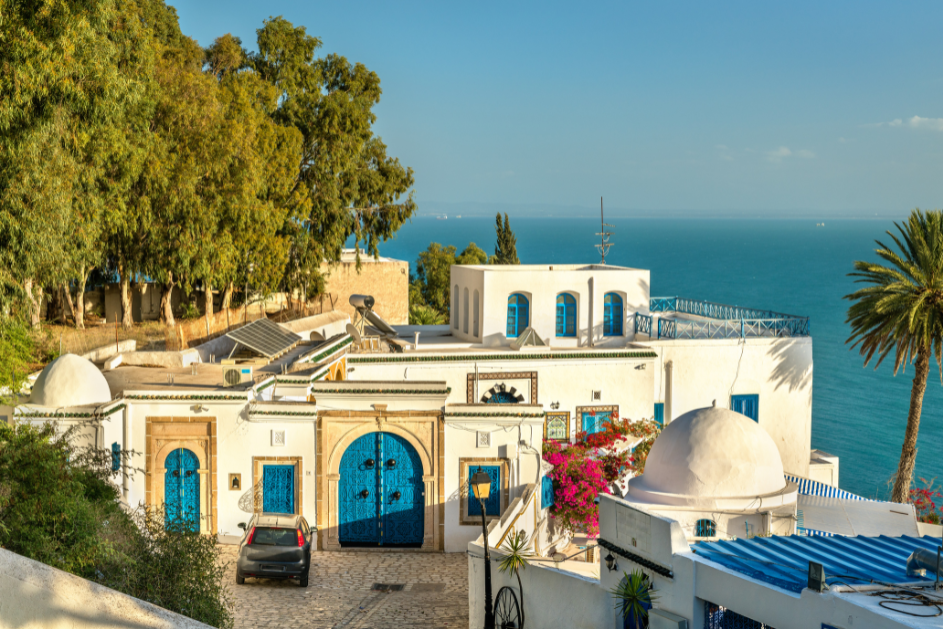
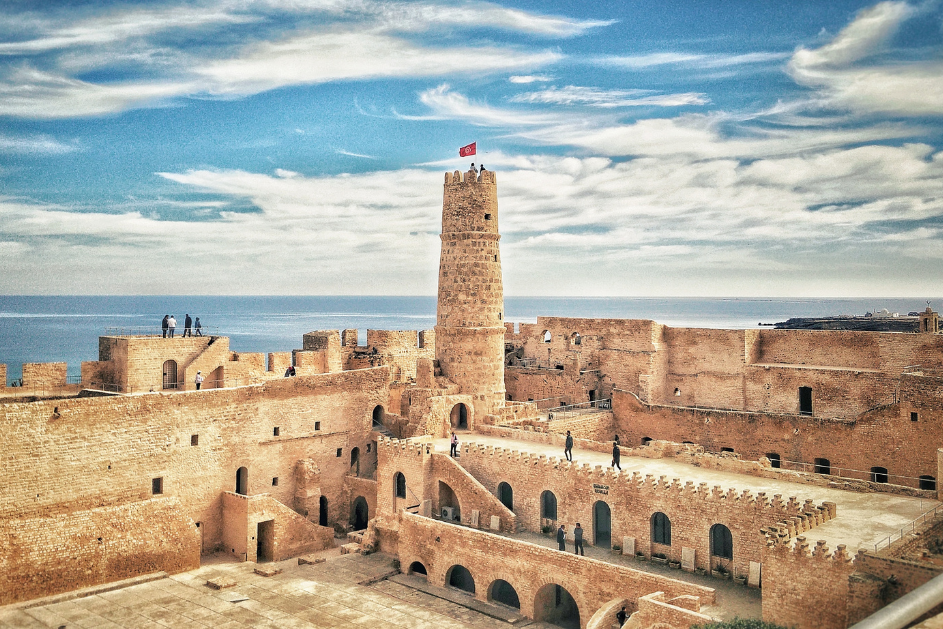
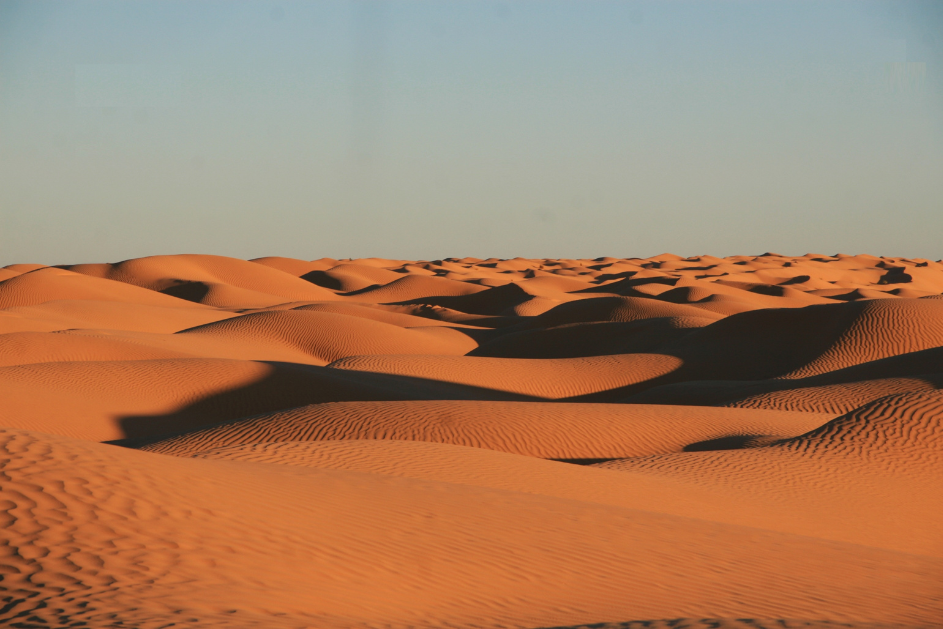
- The UNESCO-listed city of Kairouan, located in Tunisia, is considered to be the fourth holiest city of Islam after Mecca, Medina and Jerusalem.
- Tunisia is home to the largest colosseum in North Africa, the Amphitheatre of El Jem. It was built by the Romans around 238 AD and had a capacity of 35,000 people. The remains of the ancient Roman site of Dougga is considered "the most magnificent Roman site in Africa”.
- In 2020, Tunisia developed a police robot or ‘robocop’ to patrol the streets and enforce the coronavirus lockdown rules.
Further reading: N/A.
Tunisia Travel tips
Socket type: C / E. Guide to socket types.
Weekend days: Saturday and Sunday.
Driving: Cars drive on the Right.
Local taxi apps: Taxi216, Bolt.
Travel Guides: Lonely Planet.
Languages spoken: Arabic (official, one of the languages of commerce), French (commerce), Berber (Tamazight); note - despite having no official status, French plays a major role in the country and is spoken by about two thirds of the population.
Basic words and phrases in the main language:
Hello: Marhaba or As-salaam 'alykumPlease: Law samaht
Thank you: Shukran
Help: Mosa’adah
Learn more with our favorite learning app Mondly.
Find a hotel in Tunisia
Booking.comBook tours and activities:
More about Tunisia on Solo Female Travelers
Coming soon.Did you spot any errors? We do our best to keep this information updated and accurate, but things change. If you saw anything that is not right, let us know so we can fix it: [email protected].
About the Solo Female Travel Safety Index
Safety matters to solo female travelers, you told us so in our annual Solo Female Travel Survey, where year after year, women prove that this is their most important concern when traveling solo.
We wanted to do something about it, so we built these country-specific pages where you can find reviews and scores for 7 key variables affecting the safety of women traveling solo.
Variables
- Risk of scam
- Risk of theft
- Risk of harassment
- Attitudes towards women
- UK Travel Advisory
- US Travel advisory
- Global Peace Index (GPI)
Informing OSAC
The Solo Female Travel Safety Score is used by the Overseas Security Advisory Council for including safety concerns for women travelers in their country security reports; OSAC is a partnership between the U.S. Department of State and private-sector security community.
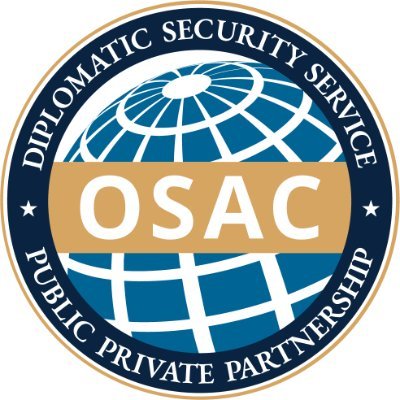
How to use the Safety Index
On this page, you will find the country score and the personal opinions on safety of other women traveling solo.
You can sort the comments by:
- The level of experience traveling solo of the reviewer (beginner = <5 trips solo, Intermediate = 5 to 10 trips solo, Experienced = >10 trips solo).
- The age of the traveler.
- Whether they are a visitor or local.
- The date they were posted.
The safety scores range from 1 to 4 with 1 being the safest and 4 being the most dangerous for solo female travelers.
Thus, the lower the score, the safer the country.
Looking for more safety resources?
This entire website is devoted to helping women travel solo. Check out the links below to learn more:
Solo Female Travel Stats: Results from the the largest, most comprehensive and only global research study on solo female travel trends, preferences and behaviors published.
Thanks to Jacobo Vilella for creating the Solo Female Travelers Safety Index ❤️






